初一英语第六单元知识点.
- 格式:doc
- 大小:25.00 KB
- 文档页数:10
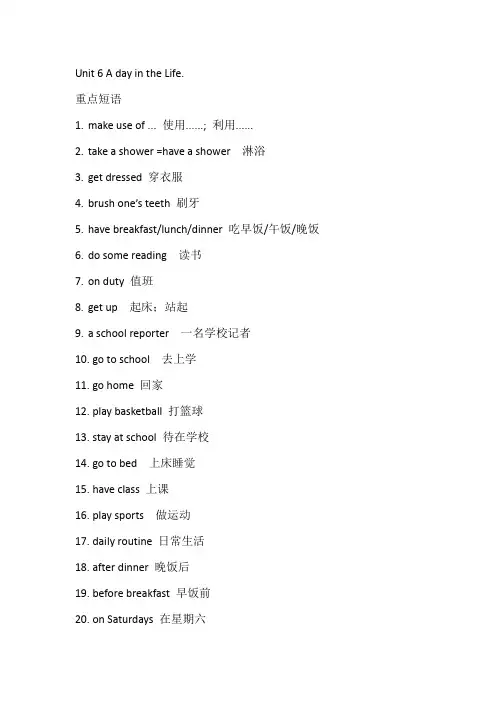
Unit 6 A day in the Life.重点短语1.make use of ... 使用......; 利用......2.take a shower =have a shower 淋浴3.get dressed 穿衣服4.brush one’s teeth 刷牙5.have breakfast/lunch/dinner 吃早饭/午饭/晚饭6.do some reading 读书7.on duty 值班8.get up 起床;站起9.a school reporter 一名学校记者10.go to school 去上学11.go home 回家12.play basketball 打篮球13.stay at school 待在学校14.go to bed 上床睡觉15.have class 上课16.play sports 做运动17.daily routine 日常生活18.after dinner 晚饭后19.before breakfast 早饭前20.on Saturdays 在星期六21.in the afternoon 在下午22.help sb. with housework 帮某人做家务23.watch a film 看电影24.for a while 一段时间25.at weekends 在周末26.a 10-minute walk 步行十分钟27.45 minutes long 四十五分钟长28.a break between lessons 课间休息29.home economics lessons 家政课30.ice hockey 冰球运动;冰上曲棍球31.prepare sth. for... 为......把某物准备好32.go to work 去上班33.get off work 下班重点句子1.How can you make good use of your time ?你怎样利用好你的时间?2.——What time do you usually get up ?你通常几点起床?——I usually get up at ... 我通常在...起床。
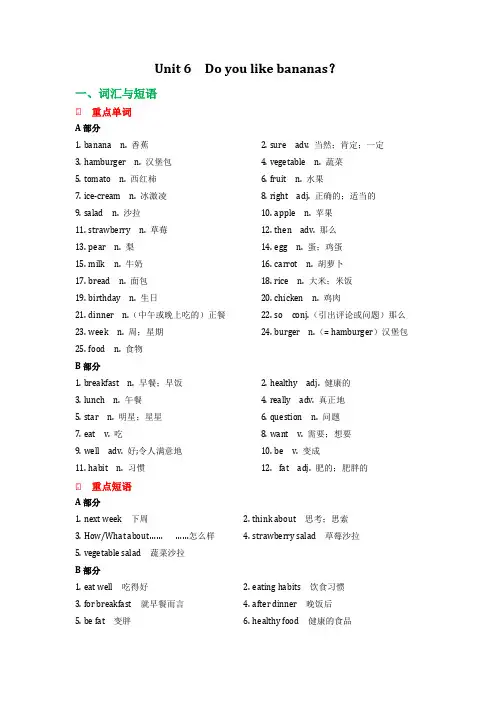
Unit 6 Do you like bananas?一、词汇与短语● 重点单词A部分1.banana n. 香蕉2.sure adv. 当然;肯定;一定3.hamburger n. 汉堡包4.vegetable n. 蔬菜5.tomato n. 西红柿6.fruit n. 水果7.ice-cream n. 冰激凌8.right adj. 正确的;适当的9.salad n. 沙拉10.apple n. 苹果11.strawberry n. 草莓12.then adv. 那么13.pear n. 梨14.egg n. 蛋;鸡蛋k n. 牛奶16.carrot n. 胡萝卜17.bread n. 面包18.rice n. 大米;米饭19.birthday n. 生日20.chicken n. 鸡肉21.dinner n.(中午或晚上吃的)正餐22.so conj.(引出评论或问题)那么23.week n. 周;星期24.burger n.(= hamburger)汉堡包25.food n. 食物B部分1.breakfast n. 早餐;早饭2.healthy adj. 健康的3.lunch n. 午餐4.really adv. 真正地5.star n. 明星;星星6.question n. 问题7.eat v. 吃8.want v. 需要;想要9.well adv. 好;令人满意地10.be v. 变成11.habit n. 习惯12.fat adj. 肥的;肥胖的● 重点短语A部分1.next week 下周2.think about 思考;思索3.How/What about…… ……怎么样4.strawberry salad 草莓沙拉5.vegetable salad 蔬菜沙拉B部分1.eat well 吃得好2.eating habits 饮食习惯3.for breakfast 就早餐而言4.after dinner 晚饭后5.be fat 变胖6.healthy food 健康的食品7.a sports star 一位体育明星8.a volleyball star 一位排球明星9.ask sb. about sth. 问某人关于某事10.one last question 最后一个问题11.want to do sth. 想要做某事● 重点句子A部分1.Do you like salad? 你喜欢沙拉吗?2.John's birthday dinner is next week. 约翰的生日聚会在下周。
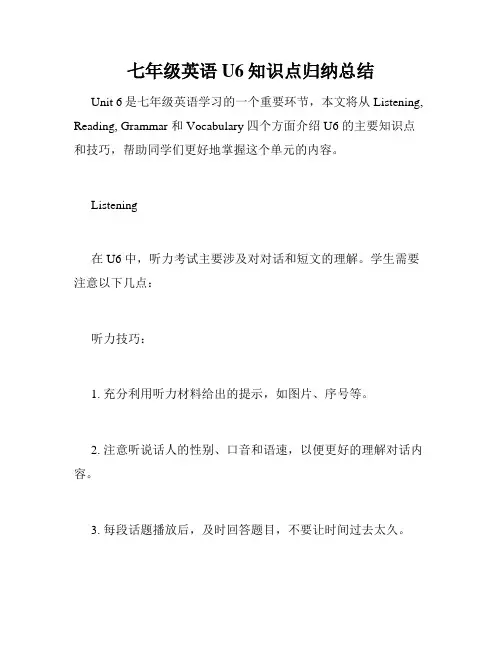
七年级英语U6知识点归纳总结Unit 6是七年级英语学习的一个重要环节,本文将从 Listening, Reading, Grammar 和 Vocabulary 四个方面介绍 U6 的主要知识点和技巧,帮助同学们更好地掌握这个单元的内容。
Listening在 U6 中,听力考试主要涉及对对话和短文的理解。
学生需要注意以下几点:听力技巧:1. 充分利用听力材料给出的提示,如图片、序号等。
2. 注意听说话人的性别、口音和语速,以便更好的理解对话内容。
3. 每段话题播放后,及时回答题目,不要让时间过去太久。
重点词语:1. 到达 (arrive)2. 乘坐 (take)3. 在...前面 (in front of)4. 在...后面 (behind)5. 花费 (spend)ReadingU6 阅读主要包括阅读短文和答题。
下面是一些阅读技巧和重点词汇:阅读技巧:1. 每段落结束后,小学生应该停下来思考,总结每个段落的主题。
2. 注意语境中的排比、比喻和重复,以更好的理解文章。
3. 了解阅读技巧中的基本题型:主旨题、推理题和细节题。
重点词汇:1. 而不是 (instead of)2. 连接 (link)3. 收集 (collect)4. 特别的 (special)5. 死亡 (death)GrammarU6 语法知识包括被动语态和名词性从句,这些知识点较为重要,同学们需要做好准备。
被动语态:1. 一般被动语态的构成:be + 过去分词。
2. 被动语态可以强调动作的承受者,而不强调动作的执行者。
名词性从句:1. 名词性从句主要用于作为名词的替代品,通常可以代替名词,如 what, where, when, why, how 等。
2. 名词性从句可以作为主语、宾语、表语或定语。
3. 名词性从句通常用于复杂句中。
VocabularyU6 的单词非常实用,例如乘坐、到达、在...前面、用完等。
下面是一些常用单词:1. 仍然 (still)2. 坐 (sit)3. 每个人 (everybody)4. 票 (ticket)5. 安静 (quiet)总结U6 是英语学习中的一个重要步骤,在听、说、读、写、词汇和语法各方面都有所涉及。
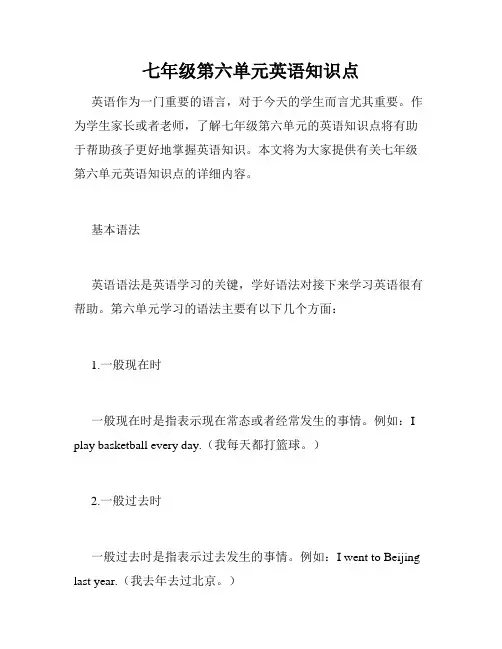
七年级第六单元英语知识点英语作为一门重要的语言,对于今天的学生而言尤其重要。
作为学生家长或者老师,了解七年级第六单元的英语知识点将有助于帮助孩子更好地掌握英语知识。
本文将为大家提供有关七年级第六单元英语知识点的详细内容。
基本语法英语语法是英语学习的关键,学好语法对接下来学习英语很有帮助。
第六单元学习的语法主要有以下几个方面:1.一般现在时一般现在时是指表示现在常态或者经常发生的事情。
例如:I play basketball every day.(我每天都打篮球。
)2.一般过去时一般过去时是指表示过去发生的事情。
例如:I went to Beijing last year.(我去年去过北京。
)3.现在进行时现在进行时是指正在进行的事情。
例如:He is reading a book.(他正在读书。
)4.情态动词情态动词表示说话人对某事做法或者行为的态度。
例如:You should take a break.(你应该休息一下。
)单词和词组在学习英语中,掌握词汇是关键。
在第六单元中,学生可以学习诸如时间、天气和健康等方面的词汇。
以下是一些重要的单词和词组示例:1.时间时间是重要的词汇之一,学生可以学习诸如星期、分钟、小时和日期等时间单位。
例句:“What time is it now?”(现在几点了?)2.天气天气是生活中常见的话题,学生可以学习描述天气的词汇,例如:晴天、雨天、阴天等。
例句:“It's a sunny day today.”(今天阳光明媚。
)3.健康健康是很重要的话题,在第六单元中学生可以学习描述健康的词汇,例如:医生、病人、药物等。
例句:“I am going to see the doctor because I don't feel well.”(我感觉不舒服,我要去看医生。
)阅读和写作阅读和写作是英语学习的重要组成部分。
在第六单元中,学生将学习如何阅读句子,并在此基础上进行写作。
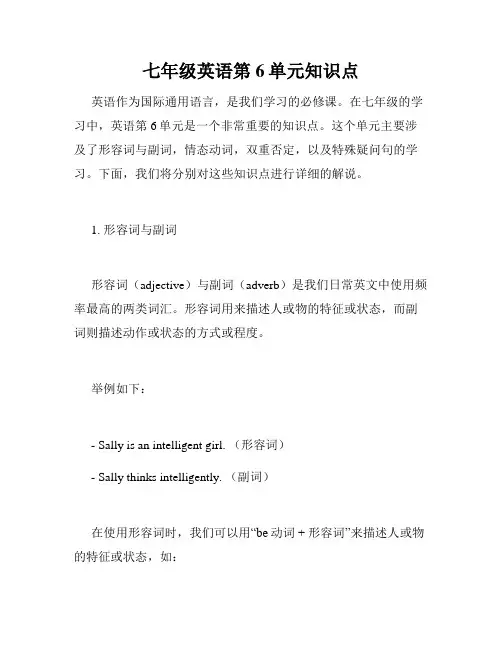
七年级英语第6单元知识点英语作为国际通用语言,是我们学习的必修课。
在七年级的学习中,英语第6单元是一个非常重要的知识点。
这个单元主要涉及了形容词与副词,情态动词,双重否定,以及特殊疑问句的学习。
下面,我们将分别对这些知识点进行详细的解说。
1. 形容词与副词形容词(adjective)与副词(adverb)是我们日常英文中使用频率最高的两类词汇。
形容词用来描述人或物的特征或状态,而副词则描述动作或状态的方式或程度。
举例如下:- Sally is an intelligent girl. (形容词)- Sally thinks intelligently. (副词)在使用形容词时,我们可以用“be动词 + 形容词”来描述人或物的特征或状态,如:- He is tall. (他很高。
)- She is beautiful. (她很漂亮。
)而副词则通常用在动词之后,来描述动作的方式或者程度,如:- She sings beautifully. (她唱得美妙。
)- He walks quickly. (他走得快。
)需要注意的是,有些形容词同时可做副词使用,如 fast, hard, early, late等,需要根据具体语境灵活应用。
2. 情态动词情态动词(modal verb)是英语中的一类重要词汇,它们用来表达说话者对某种行动或状态的态度、可能性、意愿等含义。
常见的情态动词包括can, could, may, might, will, would, shall以及should等。
举例如下:- We should help those in need. (我们应该帮助有需要的人。
)- He can play the guitar. (他会弹吉他。
)- I may be late for the meeting. (我可能会迟到会议。
)需要注意的是,情态动词不可以单独使用,它们通常要与动词原形(除了 ought to外)连用。
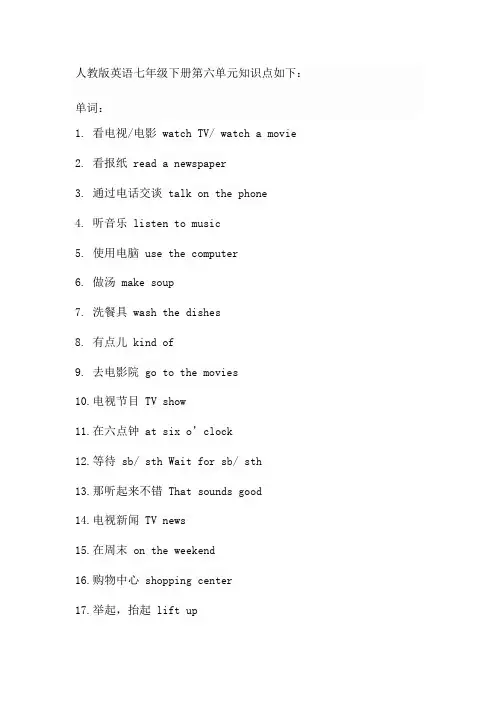
人教版英语七年级下册第六单元知识点如下:单词:1.看电视/电影 watch TV/ watch a movie2.看报纸 read a newspaper3.通过电话交谈 talk on the phone4.听音乐 listen to music5.使用电脑 use the computer6.做汤 make soup7.洗餐具 wash the dishes8.有点儿 kind of9.去电影院 go to the movies10.电视节目 TV show11.在六点钟 at six o’clock12.等待 sb/ sth Wait for sb/ sth13.那听起来不错 That sounds good14.电视新闻 TV news15.在周末 on the weekend16.购物中心 shopping center17.举起,抬起 lift up18.倒掉,倾倒 pour out19.报警 call the police20.报警电话 the police phone number21.消防电话 the fire phone number22.帮助,救援 help, rescue23.伤,受伤 hurt24.丢失,失落 lost25.迷路,迷失 lost way26.希望希望 hope to do sth/ hope that+句子27.想要,需要 want to do sth/ need sth28.谢谢你的帮助 Thank you for your help29.在乡下 in the countryside30.野餐 have a picnic31.湖,湖泊 lake32.在湖边 on the lake33.山,山峦 mountain34.在山顶 on the top of the mountain35.高楼大厦 tall building36.银行 bank37.超市 super market38.公园 park39.自然自然 nature40.电影院电影院 cinema41.剧院 theatre42.书店 book store43.学校 school44.医院 hospital45.大街,街道 street46.邮局 post office47.工厂 factory48.警察局 police station49.超市 super market50.银行 bank51.医院 hospital52.学校 school53.剧院 theatre54.公园 park55.图书馆 library56.购物中心 shopping center57.餐馆 restaurant。
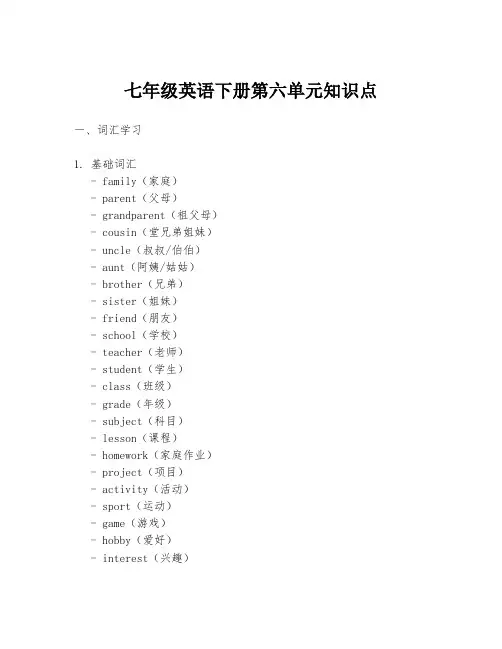
七年级英语下册第六单元知识点一、词汇学习1. 基础词汇- family(家庭)- parent(父母)- grandparent(祖父母)- cousin(堂兄弟姐妹)- uncle(叔叔/伯伯)- aunt(阿姨/姑姑)- brother(兄弟)- sister(姐妹)- friend(朋友)- school(学校)- teacher(老师)- student(学生)- class(班级)- grade(年级)- subject(科目)- lesson(课程)- homework(家庭作业)- project(项目)- activity(活动)- sport(运动)- game(游戏)- hobby(爱好)- interest(兴趣)2. 动词短语- go to school(上学)- study English(学习英语)- do homework(做家庭作业)- play sports(进行体育运动)- watch TV(看电视)- read books(读书)- listen to music(听音乐)- talk with(与...交谈)3. 常用表达- I have...(我有...)- He/She is...(他/她是...)- They are...(他们/她们是...)- We are in the same class.(我们在同一个班级。
)- My favorite subject is...(我最喜欢的科目是...)- I like to...(我喜欢...)二、语法要点1. 一般现在时- 描述习惯性动作或状态。
- 使用动词原形,第三人称单数时动词要加 -s 或 -es。
2. 代词- 主格代词:I, you, he, she, it, we, they 用于句子主语。
- 宾格代词:me, you, him, her, it, us, them 用于句子宾语。
3. 形容词性物主代词- my(我的)- your(你的/你们的)- his(他的)- her(她的)- its(它的)- our(我们的)- their(他们的/她们的/它们的)4. 名词性物主代词- mine(我的)- yours(你的/你们的)- his(他的)- hers(她的)- its(它的)- ours(我们的)- theirs(他们的/她们的/它们的)5. 介词- in(在...里)- on(在...上)- at(在...处)- with(和...一起)- for(为了)6. 特殊疑问词- Who(谁)- What(什么)- Where(哪里)- When(何时)- Why(为什么)- How(怎样)三、句型结构1. 简单句- 主语 + 动词 + 宾语/状语例如:I go to school every day.(我每天上学。
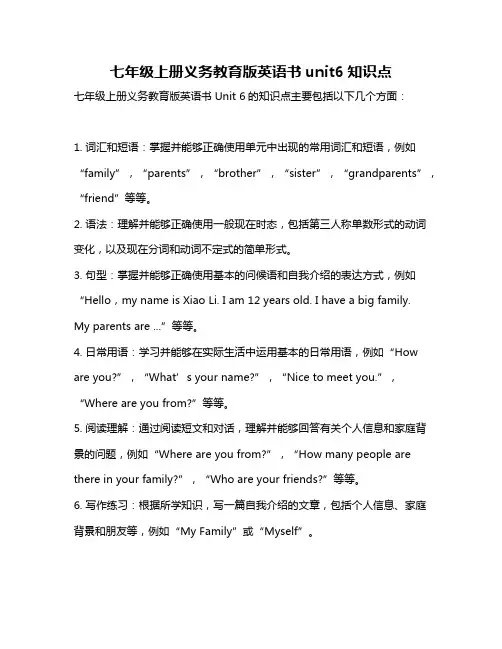
七年级上册义务教育版英语书unit6知识点
七年级上册义务教育版英语书Unit 6的知识点主要包括以下几个方面:
1. 词汇和短语:掌握并能够正确使用单元中出现的常用词汇和短语,例如“family”,“parents”,“brother”,“sister”,“grandparents”,“friend”等等。
2. 语法:理解并能够正确使用一般现在时态,包括第三人称单数形式的动词变化,以及现在分词和动词不定式的简单形式。
3. 句型:掌握并能够正确使用基本的问候语和自我介绍的表达方式,例如“Hello,my name is Xiao Li. I am 12 years old. I have a big family.
My parents are ...”等等。
4. 日常用语:学习并能够在实际生活中运用基本的日常用语,例如“How are you?”,“What’s your name?”,“Nice to meet you.”,“Where are you from?”等等。
5. 阅读理解:通过阅读短文和对话,理解并能够回答有关个人信息和家庭背景的问题,例如“Where are you from?”,“How many people are there in your family?”,“Who are your friends?”等等。
6. 写作练习:根据所学知识,写一篇自我介绍的文章,包括个人信息、家庭背景和朋友等,例如“My Family”或“Myself”。
以上是Unit 6的主要知识点,要掌握这些知识点需要大量的练习和反复的实践。
同时,要注重英语口语和听力的训练,以便在实际生活中更好地运用英语进行交流。
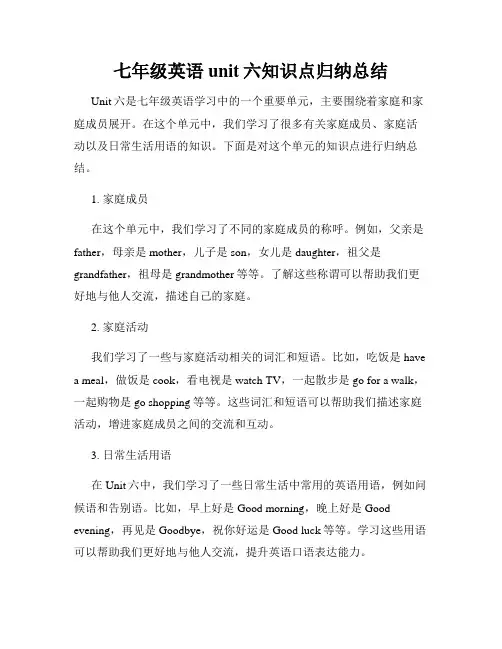
七年级英语unit六知识点归纳总结Unit六是七年级英语学习中的一个重要单元,主要围绕着家庭和家庭成员展开。
在这个单元中,我们学习了很多有关家庭成员、家庭活动以及日常生活用语的知识。
下面是对这个单元的知识点进行归纳总结。
1. 家庭成员在这个单元中,我们学习了不同的家庭成员的称呼。
例如,父亲是father,母亲是mother,儿子是son,女儿是daughter,祖父是grandfather,祖母是grandmother等等。
了解这些称谓可以帮助我们更好地与他人交流,描述自己的家庭。
2. 家庭活动我们学习了一些与家庭活动相关的词汇和短语。
比如,吃饭是have a meal,做饭是cook,看电视是watch TV,一起散步是go for a walk,一起购物是go shopping等等。
这些词汇和短语可以帮助我们描述家庭活动,增进家庭成员之间的交流和互动。
3. 日常生活用语在Unit六中,我们学习了一些日常生活中常用的英语用语,例如问候语和告别语。
比如,早上好是Good morning,晚上好是Good evening,再见是Goodbye,祝你好运是Good luck等等。
学习这些用语可以帮助我们更好地与他人交流,提升英语口语表达能力。
4. 家庭描述我们还学习了如何描述家庭。
比如,使用形容词来描述家庭成员的外貌和性格特点。
例如,我的父亲很高是My father is tall,我的妹妹有一头长发是My sister has long hair,我爷爷很慈祥是My grandfather is kind等等。
这些描述可以帮助我们更加生动地表达自己的家庭情况。
5. 所属关系在这个单元中,我们学习了表示所属关系的词汇,比如所有格的用法。
例如,我的是my,你的是your,他的是his,她的是her,我们的是our,他们的是their等等。
这些词汇可以帮助我们描述家庭成员之间的关系,更加清晰地表达彼此之间的联系。
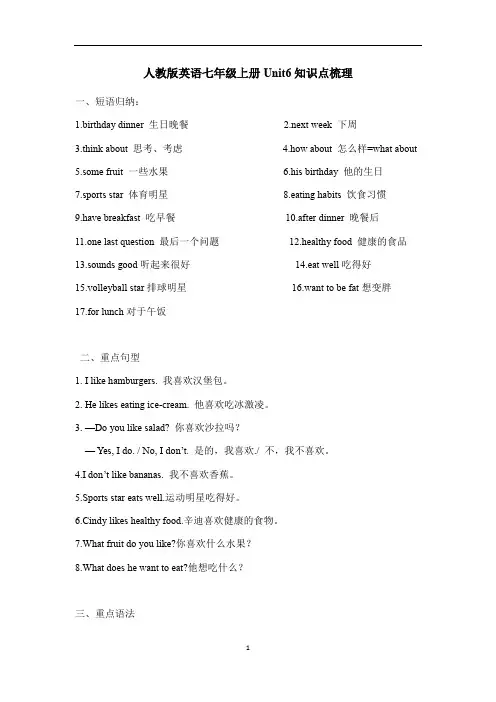
人教版英语七年级上册Unit6知识点梳理一、短语归纳:1.birthday dinner 生日晚餐2.next week 下周3.think about 思考、考虑4.how about 怎么样=what about5.some fruit 一些水果6.his birthday 他的生日7.sports star 体育明星8.eating habits 饮食习惯9.have breakfast 吃早餐10.after dinner 晚餐后11.one last question 最后一个问题12.healthy food 健康的食品13.sounds good听起来很好14.eat well吃得好15.volleyball star排球明星16.want to be fat想变胖17.for lunch对于午饭二、重点句型1. I like hamburgers. 我喜欢汉堡包。
2. He likes eating ice-cream. 他喜欢吃冰激凌。
3. —Do you like salad? 你喜欢沙拉吗?— Yes, I do. / No, I don’t. 是的,我喜欢./ 不,我不喜欢。
4.I don’t like bananas. 我不喜欢香蕉。
5.Sports star eats well.运动明星吃得好。
6.Cindy likes healthy food.辛迪喜欢健康的食物。
7.What fruit do you like?你喜欢什么水果?8.What does he want to eat?他想吃什么?三、重点语法1.可数名词:banana-bananas hamburger-hamburgers tomato-tomatoesstrawberry-strawberries pear-pears vegetable-vegetablesapple-apples egg-eggs carrot-carrots不可数名词:ice-cream salad milk bread food rice chicken(鸡肉)名词复数变化规则:(1)一般在词尾加-s。
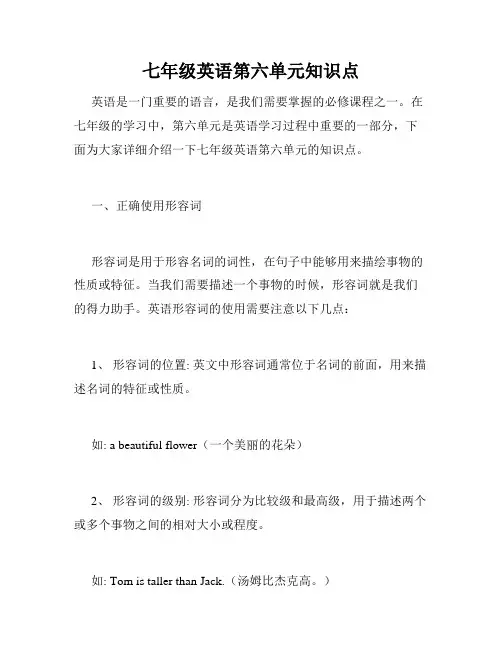
七年级英语第六单元知识点英语是一门重要的语言,是我们需要掌握的必修课程之一。
在七年级的学习中,第六单元是英语学习过程中重要的一部分,下面为大家详细介绍一下七年级英语第六单元的知识点。
一、正确使用形容词形容词是用于形容名词的词性,在句子中能够用来描绘事物的性质或特征。
当我们需要描述一个事物的时候,形容词就是我们的得力助手。
英语形容词的使用需要注意以下几点:1、形容词的位置: 英文中形容词通常位于名词的前面,用来描述名词的特征或性质。
如: a beautiful flower(一个美丽的花朵)2、形容词的级别: 形容词分为比较级和最高级,用于描述两个或多个事物之间的相对大小或程度。
如: Tom is taller than Jack.(汤姆比杰克高。
)3、形容词的正确拼写: 形容词拼写需要注意单词的变化,例如有些形容词需要在末尾加-y才能正确拼写。
如: happy → happily(高兴的→ 高兴地)二、掌握英文动词时态英文动词时态是指动词在句子中表达时间的形式。
在英语学习的过程中,掌握动词时态是非常重要的一项基础知识。
英文动词时态分为以下几种:1、一般现在时: 表示现在正在进行或者经常发生的事情。
如:I play basketball every weekend.(我每个周末都打篮球。
)2、一般过去时: 表示过去发生的事情。
如:I watched a movie yesterday.(昨天我看了一场电影。
)3、现在进行时: 表示正在发生或进行的事情。
如:I am reading a book now.(我现在在看一本书。
)4、过去进行时: 表示过去某个时间正在进行的事情。
如:I was studying English when my friend called.(我在学英语的时候,我的朋友打电话来了。
)5、完成时态: 表示动作在过去已经完成或已经发生,并对当前的情况产生一定的影响。
如:I have finished my homework.(我已经完成了我的作业。
第一节重点词汇1.1 常见名词1.1.1 pencil - 铅笔1.1.2 book - 书1.1.3puter - 电脑1.1.4 desk - 书桌1.1.5 ch本人r - 椅子1.2 介词1.2.1 at - 在……1.2.2 on - 在……上1.2.3 in - 在……内1.3 动词1.3.1 read - 读1.3.2 write - 写1.3.3 listen - 听1.3.4 speak - 说1.3.5 study - 学习第二节语法知识2.1 名词的单数和复数形式在英语中,大部分名词的复数形式都是在单数形式后加上-s或-es。
例如:book - books, pencil - pencils。
2.2 介词的用法介词用来表示名词与其他词之间的关系,常用的介词有at, on, in等。
例如:I am at school. She is in the classroom.2.3 现在进行时态现在进行时态表示现在正在进行的动作。
构成:主语 + am/is/are + 动词的现在分词。
例如:She is reading a book. They are writing on the blackboard.第三节阅读理解3.1 阅读理解题型阅读理解题型是考察学生理解文章内容,并能够根据文章内容回答问题。
学生需要理解文章的大意,找出关键信息进行分析。
3.2 阅读技巧提醒学生在做阅读理解题时要细心阅读文章,注意找出关键词和关键信息,理清思路,避免在细节上迷失方向。
3.3 阅读材料阅读材料通常为日常生活或学习中的场景,包括课堂、图书馆、家庭等。
学生需注意理解这些场景中的人物和活动。
结语英语七年级上册第六单元知识点主要包括常见名词、介词、动词以及名词的单数和复数形式等基础知识,同时也涉及了语法知识中的介词用法和现在进行时态。
在阅读理解方面,学生需培养良好的阅读习惯和技巧,注重理解文章内容,找出关键信息,做到以阅读为基础,理解为重点。
七年级英语unit六知识点归纳Unit 6: Hobbies七年级英语unit六知识点归纳Unit 6 focuses on hobbies, leisure activities that individuals enjoy doing in their free time. In this unit, students will learn how to talk about their hobbies, express preferences, and share experiences with others. Here are some of the key points covered in Unit 6:1. VocabularyIn this unit, students will learn new vocabulary related to hobbies. They will learn words such as "collect," "paint," "play music," and "watch movies." It is essential to memorize these words and understand their meanings to communicate effectively about hobbies.2. Verb + -ingStudents will learn how to use the verb + -ing structure to describe their hobbies. For example, "I enjoy swimming" or "She hates shopping." Through practice, students can master verb + -ing easily.3. Expressing preferencesIn Unit 6, students will learn how to express their preferences in hobbies. They will learn phrases such as "I prefer playing soccer to watching TV" or "He likes swimming more than dancing." It is essential to learn these phrases to express opinions about hobbies.4. Adverbs of frequencyAdverbs of frequency, such as "always," "usually," and "never," are introduced in this unit. Students will learn how to use these adverbs to talk about how often they do an activity. For example, "I always play basketball on weekends" or "I never watch horror movies." It is essential to use adverbs of frequency correctly to communicate accurately.5. Listening and speakingIn this unit, students will listen to conversations about hobbies and answer questions. They will also practice speaking about their hobbies, sharing experiences, and expressing opinions. Through this practice, students can improve their listening and speaking skills.6. WritingStudents will also learn how to write a short paragraph about their hobbies. They will learn how to organize their ideas and use the correct vocabulary and grammar to express themselves clearly. Practicing writing in English can improve vocabulary, grammar, and overall language skills.In conclusion, Unit 6 focuses on hobbies and leisure activities. By learning new vocabulary, grammar structures, and expressions related to hobbies, students can communicate fluently and effectively in English. Regular practice of listening, speaking, and writing about hobbies can improve language skills and enrich the learning experience.。
七年级上册u6的知识点七年级上册Unit 6的知识点Unit 6是七年级上册英语教材中的一单元,主要涉及到一些日常生活中的用语和对话。
本文将为大家详细介绍Unit 6的知识点。
1. 介绍自己当我们第一次见到新的朋友或者老师时,通常需要介绍自己。
下面是一个简单的自我介绍的范例:Hello! My name is Tom. I'm 13 years old. I'm from China. I like playing basketball and reading books. Nice to meet you!这里需要注意的是,我们在介绍自己的时候要注意用到一些基本的动词时态,比如现在时和一般过去时。
同时,我们需要注意一些基本的单词和短语,比如名字、年龄、出生地和爱好等。
2. 问候与回应在日常生活中,我们经常需要用到一些问候和回应的用语。
下面是一些常见的问候和回应:- Good morning! 早上好!- Good afternoon! 下午好!- Good evening! 晚上好!- How are you? 你好吗?- I'm fine, thank you. 我很好,谢谢。
- Nice to meet you! 很高兴见到你!总的来说,在问候和回应时我们需要注意礼貌和尊重对方的感受。
3. 请求和回答在日常生活中,我们也经常需要请求和回答一些问题。
下面是一些常见的请求和回答:- Can you help me? 你能帮我吗?- Sure. 当然。
- Could you pass me the book, please? 你能把书递给我吗?- Here you are. 给你。
- May I borrow your pen? 我可以借下你的笔吗?- Sorry, I don't have a pen. 很抱歉,我没有笔。
在请求和回答的过程中,我们需要注意礼貌和尊重对方的意愿。
七年级英语上册第六单元的必背知识点一、词汇生活与健康相关:lifestyle(生活方式)、healthy(健康的)、unhealthy(不健康的)、fit(健康的)、food(食物)、hamburger (汉堡包)、sweet(糖果/甜点)、vegetable(蔬菜)、fruit(水果)、chocolate(巧克力)、lemon(柠檬)、watermelon(西瓜)、beef(牛肉)、carrot(胡萝卜)、pork(猪肉)、snack(小吃/零食)、sugar(糖)、tooth(牙齿,复数形式为teeth)、computer game(电脑游戏)、cola(可乐)等。
日常活动相关:plan(计划)、pool(水池/水塘,特指swimming pool游泳池)、keep(保持)、change(改变)、take a walk(散步)、total(总的/总计的)、score(得分)、point(分数)、order(点/订)、menu(菜单)、bean(豆/豆科植物)等。
时间与数量相关:noon(正午)、less(较少的/更少的)、than(比)、more than(多于/不仅仅)、a piece of(一块/一片/一张/一件……)、kilo/kilogram(千克/公斤)、carton(盒)、bottle(瓶子)等。
二、短语健康与饮食:be good/bad for sb.(对某人有好处/坏处)、keep fit/healthy(保持健康)、eat/have breakfast/lunch/dinner(吃早/午/晚饭)、eat healthy food(吃健康食物)、eat well(吃得营养)、seldom eat sweet snacks(很少吃甜食)、eat more fruit and vegetables(吃更多的水果和蔬菜)、drink a lot of water(喝大量的水)、have soup(喝汤)等。
第六单元知识点一.短语1 next week 下一周2 think about 考虑3 how about = what about4 eating habit 饮食习惯I have a good eating habit.5 ask about+事物询问I ask about her eating habitsask 某人about 某事I ask you about your eating habits6 ask …for…问某人关于某事7 have fruit for dinner 晚餐吃水果have +食物for 三餐(breakfast, lunch, dinner)吃……当三餐8 like +食物+ for+ 早餐/中餐/晚餐想吃……做早餐What do you like for breakfast?9 healthy food 健康的食物10 volleyball star 排球明星11 breakfast lunch dinner(supper)12 ask questions问问题①the next question 下一个问题②the/a/one last question 最后一个问题③the easy question 一个简单的问题13 a lot of= lots of 很多的……I eat a lot of ice-cream. She eats a lot of apples. Thank you a lot.= Thank you very much.非常感谢你二重点知识点①本单元名词分类可数名词不可数名词可数不可数两种情况Hamburgers, eggs, oranges, bananas, apples, pears, carrots, vegetables, tomatoes, strawberries,apple…. milk water, bread, rice,CokeFood, fruit, ice-cream, salad,chicken, food. fish,ice cream、salad、chicken,fruit,food这几个名词既可做抽象概念又可做具体的个体名词,当表示抽象概念的时候是不可数的,但强调个体的时候是可数的。
英语七年级下册第六单元知识点一、重点单词。
1. newspaper.- 可数名词,意为“报纸”。
例如:I read a newspaper every day.(我每天读一份报纸。
)- 它的复数形式是newspapers。
2. use.- 动词,意为“使用;运用”。
例如:We use pens to write.(我们用钢笔写字。
)- 常用短语:use sth. to do sth.(用某物做某事)。
3. soup.- 不可数名词,意为“汤”。
例如:I like drinking tomato soup.(我喜欢喝西红柿汤。
)4. wash.- 动词,意为“洗”。
例如:I wash my clothes on weekends.(我在周末洗衣服。
)- 常见短语:wash one's hands(洗手);wash one's face(洗脸)。
5. movie.- 可数名词,相当于“film”,意为“电影”。
例如:I want to see a movie tonight.(我今晚想看电影。
)6. just.- 副词,有多种含义。
- 意为“只是;恰好”。
例如:He is just a child.(他只是个孩子。
)- 还可表示“刚刚”,常与现在完成时连用。
例如:I have just finished my homework.(我刚刚完成我的家庭作业。
)7. drink.- 作动词时,意为“喝;饮”。
例如:Don't drink too much cola.(不要喝太多可乐。
)- 作名词时,意为“饮料”。
例如:There are many kinds of drinks in the supermarket.(超市里有很多种饮料。
)8. tea.- 不可数名词,意为“茶”。
例如:Would you like some tea?(你想要些茶吗?)9. tomorrow.- 副词或名词,意为“明天”。
Unit6 Do you like bananas?一、单词过关(一汉译英:香蕉汉堡包西红柿冰激凌沙拉草莓梨牛奶面包生日正餐周、星期食物蔬菜水果正确的苹果那么鸡蛋胡萝卜米饭鸡肉那么早饭午餐星星、明星吃令人满意的习惯健康的真正的问题需要变成肥胖的(二根据首字母或汉语提示拼写单词:1. ----When is your b , Nick? ---- It’s on June 15th.2. ----Do you n a bag for school? ----No, I don’t. I ha ve one already.3. We should eat lots of vegetable to keep h .4. They usually have breakfast at home and l at school.5. Apples, bananas and pears are all f .6. There are seven days in a w .7. Does anyone know the r answer to this question?8. Good eating h are important to our health.9. Dale likes to have a piece of bread, an apple and a cup of milk for b .10. Eric is very f because he always eats too much.11. Linda doesn’t like vegetables. She only e meat.12. Monkeys like eating b .13. How much are those _________________(西红柿.14. An ____________(苹果 a day keeps the doctor away.15. Doctors says ________(胡萝卜are good for me.16. Mary likes ___________________(草莓 very much.17. Playing basketball is easy and interesting. I _____________(真正地 like this game.18. Americans like eating _______________________(汉堡包.19. We want a lot of ________________(蔬菜 and fruit.20. Of all the fruits, Dale likes ____________(梨 best.21. It’s so hot that I want to eat __________(冰激凌.22. ___________(鸡肉is a kind of good food for me.23. The cow gives us ____________(牛奶.24. I eat two_________(鸡蛋 for breakfast.25. Jenny likes eating _______________(橘子 very much.26. Foreigners like having ____________(面包 for breakfast.27. Dale can speak Chinese very ____________(好.二、必背短语(一英译汉:think about How about…?next week birthday dinner eating habits volleyball star after dinner want to be fat吃早饭吃中饭吃晚饭最后一个问题确实喜欢健康的事物三、重要句型1. 你喜欢香蕉吗?是的,我喜欢。
Do you ? Yes,.2. 让我们想想(吃什么食物吧。
Let’s the food.3. 那你喜欢什么水果?So do you like?4. 我可不想变胖。
I want to .5. 早饭你吃什么?What do you have ?6. 他不喜欢吃蔬菜。
He like .7. 大卫询问了有关网球明星,辛迪•史密斯的饮食习惯。
David the volleyball star, Cindy Smith, her habits.8. 我喜欢冰激凌,但是我不吃它。
I ice cream, I eat it.9.我喜欢晚饭后吃冰激凌做为甜点。
I like to eat ice-cream ______ dessert __________ dinner.10. 来点沙拉和蔬菜怎么样?_________ _________ some salad and vegetables?11. 爱丽斯总是首先考虑她的孩子。
Alice always ________ _________ her children first.四、重点突破(一Do 或Does 引导的一般疑问句,及其肯定与否定回答基本结构:Do/Does + 主语+ 动词原形……?Yes, 主语(代词 do/does. No, 主语(代词don’t/doesn’t.don’t 和do esn’t 都是助动词的否定形式,构成否定句,后面接动词原形基本结构:主语+ don’t/doesn’t + 动词原形单选:1. ----Do you like bread? ----_____________.A. Yes, I do.B. Yes, I am.C. No, I’m not.D. No, I do.2. _____ your son eat salad? No, he _______.A. Does; don’tB. Is; doesn’tC. Does; doesD. Does; doesn’t.3. My friend _______like ice-cream.A. don’tB. doesn’tC. isn’tD. aren’t.4. Her parents _________ let her go out after 9:00 in the evening.A. doesn’tB. don’tC. aren’tD. are句型转换:1.He likes milk and eggs for breakfast.(改为一般疑问句___________he _________milk and eggs for breakfast?2. They like pears.( 改为一般疑问句________they _________pears?3. Tom watches TV every day. ( 改为一般疑问句_________Tom_________TV every day?4. Do they play sports every day?( 用Mike代替they ________Mike __________ every day?5. Do your friends have story-book? (作肯定回答Yes, _________ ___________.6. Does his sister like playing piano?(作否定回答No. ________ ___________.7. I like salad and bread. (改成否定句I _________ _________ salad and bread.8. He likes eating eggs for breakfast. (改成否定句He _______ ________ eating eggs for breakfast.(二 like 的用法like 意为:喜欢,后接名词或动词的ing 形式,做宾语;like to do sth 通常表示一次性或临时的、具体的喜好;like 也可作为介词,意为:像……一样。
例句:1. I like Chinese food.2. He likes watching TV.3. He likes to watch TV this afternoon.4. She looks like her mother.用like的适当形式填空:1. I _________playing football with my friends after school.2. My friend ________ __________ ice- cream.3. _______ your father ____________ soccer? Yes, he _______ it very much.4. They ________ __________ volleyball, because they think it’s too difficult.5. She _________ shopping. She often goes shopping on Sunday afternoon.6. She looks _______ her mother.(三可数名词和不可数名词(既可数又不可数的名词1. 名词复数形式构成的基本规则1一般在词尾加:s 如:books ; eggs2词尾是s ,x, ch, sh 则加: es 如:boxes; watches3 词尾是f或fe , 先变f或fe 为ve 再加:s 如:wife--wives4词尾是o,有生命体征的加:es; 没有生命体征的加:s 如:tomatoes/photos5 以辅音字母加y 结尾的名词,变y为i,再加:es 如:baby--babies2. 名词的分类将下列单词变成复数形式:tomato strawberry photowatch Chinese boxbaby man footchild vegetable dictionary( she it I根据提示拼写单词:1.I have an _____________(冰激凌.2.There are four ____________________(西红柿 on the table.3.Jane has two _______________(手表.4.These are ___________________(橘子.5.Julia has some ______________________(朋友 in this school.6.They often eat _________________________(蔬菜 every day.7.The girl doesn’t like _________________________(草莓,but she likes pears.8.He often has some __________________(面包and ____________(牛奶 for breakfast.9.Do you like some ___________________(橘子juice? It’s sweet and fresh.10.I have some _____________(鸡肉 for lunch.将下列单词分类:carrot orange apple bread rice water salad food fruit strawberryice-cream milk meat chicken pear egg tomato juice beefCountable nouns:Uncountable nouns:Countable and uncountable nouns:(四在一般现在时中,当主语是第三人称单数的时候,动词的形式的变化1. 一般动词,词尾加:s 如:eat---eats2. 以o, s, x, ch, sh 结尾的动词,词尾加:es 如:watch---watches wash---washes3. 以辅音字母加y 结尾的动词,变y为I 加es 如:fly---flies carry---carries4. have 的第三人称单数形式是has给动词的正确形式填空:1.Mary ________(have bread and milk for breakfast.2.Lots of children in our school ________(go to school in foot.3.My mother always__________(watch TV every day.4.The boys often ________(play football after school.5.We __________(do morning exercises every morning.6.Let’s ________(eat some broccoli.7.Mike’s brother ________(like ice cream.8.They _____ _________ (not like playing basketball.9.My father _________(have supper at home every day.10.Mr. Green _______ ________(not have lunch every day.。